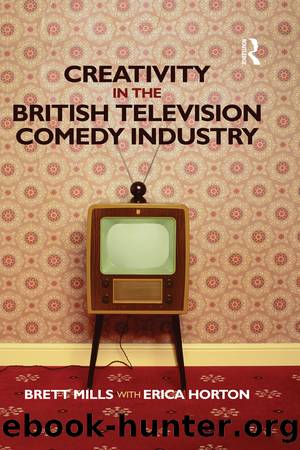Creativity in the British Television Comedy Industry by Brett Mills Erica Horton

Author:Brett Mills, Erica Horton [Brett Mills, Erica Horton]
Language: eng
Format: epub
Tags: Social Science, Media Studies
ISBN: 9781317614548
Google: zC8lDwAAQBAJ
Publisher: Taylor & Francis
Published: 2016-10-14T04:16:41+00:00
5
Creativity and established programmes
Introduction
Evident in the material presented so far is the centrality of precarity to the experience of working within the television comedy industry. This precarity is something all workers spend much time mitigating, often producing a large number of ideas in order to increase chances of getting a commission. This precarity is predicated on the fact that television production is, on the whole, project-based work. Yet there are periods in creative careers where precarity is lessened, and this is when programmes individuals work on receive ongoing commissions, thereby becoming long-term providers of work. Such commissions give job security to those working on them, and can be financially lucrative, depending on the specific contractual aspects any individual worker might have. This chapter therefore explores the creative process that takes place beyond programmesâ first series, instead examining how creative workers experience working on second or third series. The analysis here works from the assumption that there are differences between the creative processes required for the initial setting-up of a production and those necessary for the maintenance of long-running series. So, while longer-term commissions might mitigate against the precarity the majority of creative workers regularly encounter, they also require those workers to find ways to manage the need to produce large volumes of creative material. This chapter explores, then, creative workersâ experiences of the specific kinds of labour necessitated by ongoing series, and the impacts (both positive and negative) these might have on creativity.
This focus points to one of the specificities of broadcast television. That is, television typically employs serial, episodic formats whereby extended narratives can be delivered within discrete episodes over many years; the soap opera is perhaps the most obvious example of this. While other media, such as films and books, can similarly develop recurring franchises and long-running narratives, their serial aspect is far less embedded within their form. The broadcast nature of television, however, encourages serialisation, and the vast majority of television programmes are episodic. This enables a longer-term approach to the creative process, whereby production teams can work for many years on multiple series of a programme (though it is unlikely this will be the only thing any individual will work on during that time). The long-term, episodic nature of television means that the kinds of creative ideas that would be appropriate for another medium are unlikely to get commissioned for broadcasting. There are relatively few one-off comedies, for example; though broadcasters such as the BBC and Channel 4 do experiment with such material via their âFeed My Funnyâ and âComedy Blapsâ schemes. The intention behind such one-off commissions, however, is the hope of finding an idea that can then be turned into a long-run, episodic series, which means these function as pilots. This episodic necessity is therefore built into the creative process, and some of our interviewees noted there was little incentive to come up with ideas that would work only as a one-off. The serial nature of broadcast television is thus one of the key
Download
This site does not store any files on its server. We only index and link to content provided by other sites. Please contact the content providers to delete copyright contents if any and email us, we'll remove relevant links or contents immediately.
Lois & Clark: A Superman Novel by C. J. Cherryh(755)
Film Studies: An Introduction (Film and Culture Series) by Ed Sikov(688)
Cinematography: Theory and Practice by Brown Blain;(624)
The Making of Star Wars (Enhanced Edition) by Rinzler J. W(580)
On directing film by Mamet David(574)
Film Studies by Ed Sikov(548)
Digital Compositing for Film and Video by Steve Wright(535)
True Blue by David Baldacci(517)
Baldacci, David - True Blue by Baldacci David(511)
Modern Nature by Derek Jarman(488)
Hitchcock by Rothman William(488)
Free Play: Improvisation in Life and Art by Stephen Nachmanovitch(471)
Film Lighting by Kris Malkiewicz(460)
The Men who Made the Movies by Schickel Richard(437)
When I Stop Talking, You'll Know I'm Dead: Useful Stories From a Persuasive Man by Jerry Weintraub(428)
iMovie: The Missing Manual by David Pogue and Aaron Miller(392)
The After Effects Illusionist by Perkins Chad(373)
Four Screenplays by Syd Field(373)
After Effects Apprentice, by Meyer Chris Meyer Trish(344)
